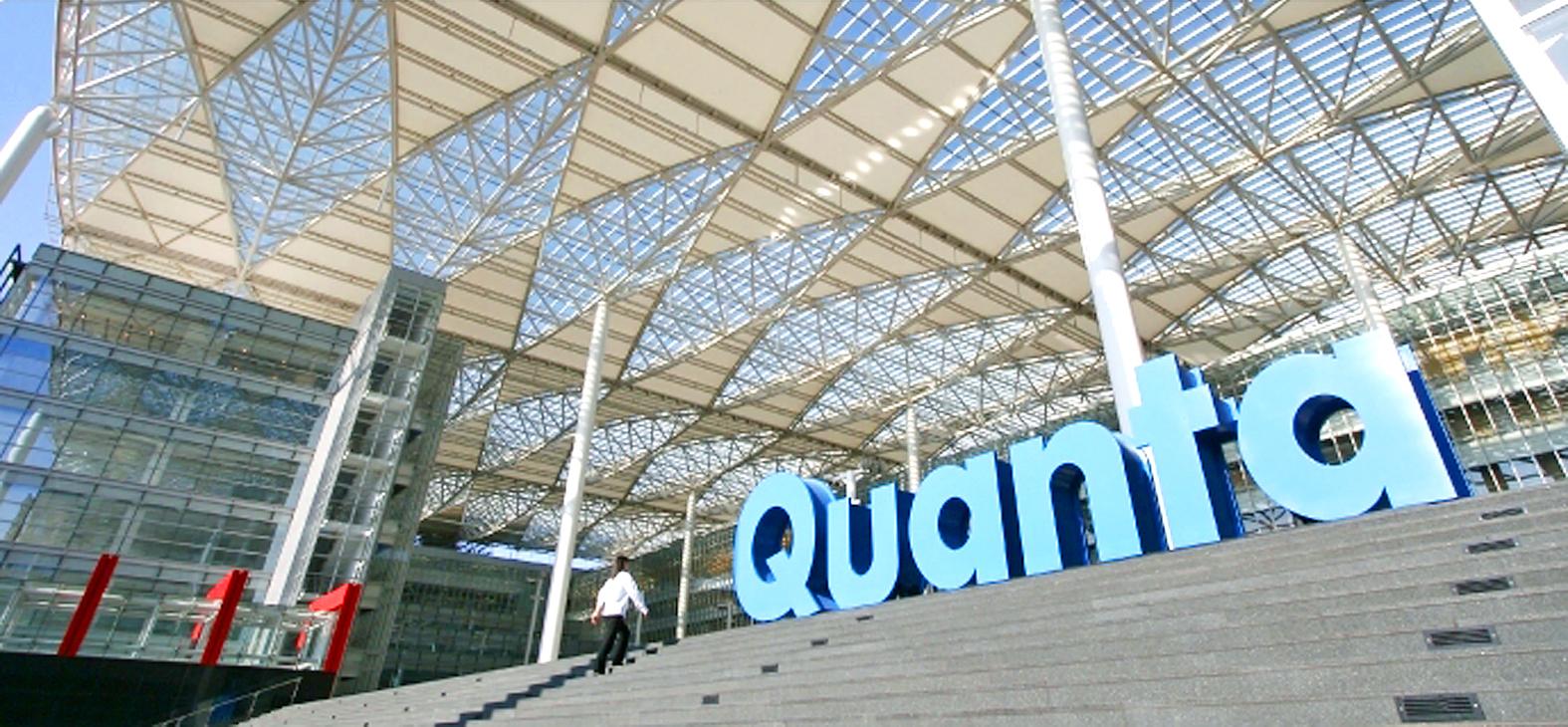Quanta Shanghai Manufacturing City (QSMC, 廣達上海製造城) would seem like an ideal site to implement China’s “closed loop” management system, meant to prevent the spread of COVID-19, that requires staff to live and work on-site in a secure bubble.
Sprawled over land the size of 20 football fields, the campus houses factories, living quarters for 40,000 workers and a supermarket.
Yet as COVID-19 breached Quanta’s defenses, the system turned into chaos on Thursday.

Photo: Screenshot from Quanta’s Web site
Videos posted online showed more than 100 Quanta workers physically overwhelming security guards in hazmat suits and vaulting over factory gates to avoid being trapped inside the factory amid rumors that workers that day tested positive for the virus.
The turmoil at Quanta underscores the struggles Shanghai faces to get its factories, many of them key links in global supply chains, back up to speed, even as much of the city remains locked down under China’s “zero COVID” policy.
Taiwan-based Quanta Computer Inc (廣達電腦) assembles about three-quarters of Apple Inc’s global MacBook production, and also makes circuit boards for Tesla Inc.
Quanta set up a closed loop to restart work at the factory on April 18 using about 5 percent of its workers, or 2,000 employees, with plans to triple that by April 22.
Chinese state media touted the restart as an example of how Shanghai was keeping business running while adhering to stringent COVID-19 measures.
However, cases have been reported daily at an address belonging to the campus from March 26 to Wednesday, Shanghai government data showed.
Calls seeking help to bring attention to positive cases that were not being isolated at Quanta began appearing on Weibo from April 6, five days after Shanghai implemented a city-wide lockdown.
Employees began posting photos and reports on Douyin (抖音), known as TikTok outside China, showing dozens of workers lining up for buses to be taken to central quarantine facilities.
They also took videos of themselves resting in Shanghai’s National Exhibition and Convention Center, one of the city’s largest quarantine centers, as well as at a facility purpose-built to house Quanta workers.
Two employees and a person with knowledge of the campus’ operations said there were multiple infections there.
“Each dormitory reported a few positive cases a day, and eventually everyone became positive,” said one of the two workers, who gave his surname as Li (李), adding that there were eight cases in his room, including himself.
Employees said that cases were often not isolated for days after testing positive, and one source said there were not enough isolation spaces, resulting in infections.
That was a trigger for Thursday night’s chaos, employees said, as rumors spread that positive cases had been found in the factories.
The workers were spooked by an order telling them not to return to their dormitories, raising fears that they could be locked down inside the plant.
While videos of the confrontation were removed, discussion continued online, with one user simply saying: “What a mess.”

When Lika Megreladze was a child, life in her native western Georgian region of Guria revolved around tea. Her mother worked for decades as a scientist at the Soviet Union’s Institute of Tea and Subtropical Crops in the village of Anaseuli, Georgia, perfecting cultivation methods for a Georgian tea industry that supplied the bulk of the vast communist state’s brews. “When I was a child, this was only my mum’s workplace. Only later I realized that it was something big,” she said. Now, the institute lies abandoned. Yellowed papers are strewn around its decaying corridors, and a statue of Soviet founder Vladimir Lenin

UNIFYING OPPOSITION: Numerous companies have registered complaints over the potential levies, bringing together rival automakers in voicing their reservations US President Donald Trump is readying plans for industry-specific tariffs to kick in alongside his country-by-country duties in two weeks, ramping up his push to reshape the US’ standing in the global trading system by penalizing purchases from abroad. Administration officials could release details of Trump’s planned 50 percent duty on copper in the days before they are set to take effect on Friday next week, a person familiar with the matter said. That is the same date Trump’s “reciprocal” levies on products from more than 100 nations are slated to begin. Trump on Tuesday said that he is likely to impose tariffs

HELPING HAND: Approving the sale of H20s could give China the edge it needs to capture market share and become the global standard, a US representative said The US President Donald Trump administration’s decision allowing Nvidia Corp to resume shipments of its H20 artificial intelligence (AI) chips to China risks bolstering Beijing’s military capabilities and expanding its capacity to compete with the US, the head of the US House Select Committee on Strategic Competition Between the United States and the Chinese Communist Party said. “The H20, which is a cost-effective and powerful AI inference chip, far surpasses China’s indigenous capability and would therefore provide a substantial increase to China’s AI development,” committee chairman John Moolenaar, a Michigan Republican, said on Friday in a letter to US Secretary of

Taiwan Semiconductor Manufacturing Co’s (TSMC, 台積電) market value closed above US$1 trillion for the first time in Taipei last week, with a raised sales forecast driven by robust artificial intelligence (AI) demand. TSMC saw its Taiwanese shares climb to a record high on Friday, a near 50 percent rise from an April low. That has made it the first Asian stock worth more than US$1 trillion, since PetroChina Co (中國石油天然氣) briefly reached the milestone in 2007. As investors turned calm after their aggressive buying on Friday, amid optimism over the chipmaker’s business outlook, TSMC lost 0.43 percent to close at NT$1,150